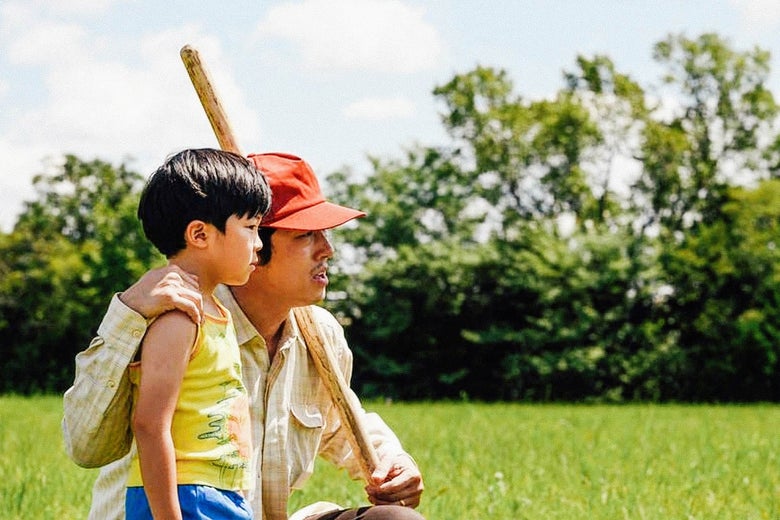
Film Review: Minari
Film Reviews
Minari
Director: Lee Isaac Chung
A24 and Plan B Entertainment
In Theaters 02.12
There seems to be a trend toward at least one predominantly Korean-language film contending for the “Best Picture” Oscar, with Parasite winning last year and Minari being a virtual lock for a nomination. Despite the whiny sentiments of certain currently unemployed New Yorkers living in Florida, this is entirely a good thing.
Minari the the story of the Yi family, Korean-Americans who move from California to Arkansas in the 1980s. They’ve moved in search of their own American Dream of prosperity on a new plot of land where Jacob (Steven Yeun, The Walking Dead) hopes to grow Korean produce to sell to vendors in Dallas. He enlists the help of Paul (Will Patton, Remember the Titans), an eccentric and devoutly religious local (he spends every Sunday lugging a full-size cross around town on his back). While Jacob remains very optimistic about the life ahead, his wife, Monica (Yeri Han, My Unfamiliar Family), worries about their financial difficulties, as well as their son David’s heart condition. Jacob and Monica work long hours sexing chicks—checking baby chicks to see if they are male or female—and they send for Monica’s mother, Soon-ja (Youn Yuh-jung, Sense8), to come live with them and help with the children. The sly, foulmouthed and incredibly loving grandmother works to build a relationship with the children as Jacob and Monica struggle to save their own.
Writer-director Lee Isaac Chung has created one of the all-time greatest films about the American family with this masterpiece. Minari establishes him as a great filmmaker but is so good that it’s frankly hard to imagine where he can go from here. As Soon-ja takes her grandchildren, Anne (Noel Kate Cho) and little David (Alan Kim), to plant minari seeds by the creek, she teaches them about the resilience of the plant and how of its many uses and endless potential, and she predicts plentiful growth. The metaphor is obvious but touching. The film is disarmingly relatable, from the children’s palpable sense of dread every time their parents argue to Monica’s anguish over Jacob’s single-minded obsession with success at farming to the point where he shuts out everything else, to Jacob’s burning need to feel like he has made something of himself—and even the reluctant, sincere acceptance of the weird, thought eventually harmless, neighbor into the extended family.
Yeun gives a stellar performance as Jacob. It’s a rare opportunity for an Asian-American actor to be given a character who is so fully realized as both Asian and American without ever playing to stereotypes or trying so hard to avoid them that it dulls down the edges. Yeun is a highly versatile talent—I personally am most familiar with his work as a voice actor on Trollhunters—but he never gets to play the lead, and I certainly hope that a likely Oscar nomination for Minari will help fix that for him.
Yeun is matched by Han, who is superbly real as the frustrated Monica, and Youn’s irascible grandma is a major highlight of the film, particularly when she is playing off of Kim’s David. It’s actually Kim who arguably deserves the most attention here because as great as everyone else is, this remarkable boy gives a surprisingly complex and nuanced performance that speaks volumes about Chung’s skill as a director.
Minari is an emotional and lyrical work of art, and a moving portrait of assimilation and the immigrant experience. But most of all, at its heart, it’s an ode to the hard work and rewards that come with being part of a family. It’s an immensely entertaining slice of life, brimming over with laughter, tears, joy, heartbreak and hope. Minari is a tale of love and perseverance that transcends language, cultural and generational barriers, and it’s the kind of movie that feels so effortless that it demands that everyone out there making mediocre, insincere films tries harder to bring their A-game next time instead of settling for the “good enough” school of moviemaking. –Patrick Gibbs